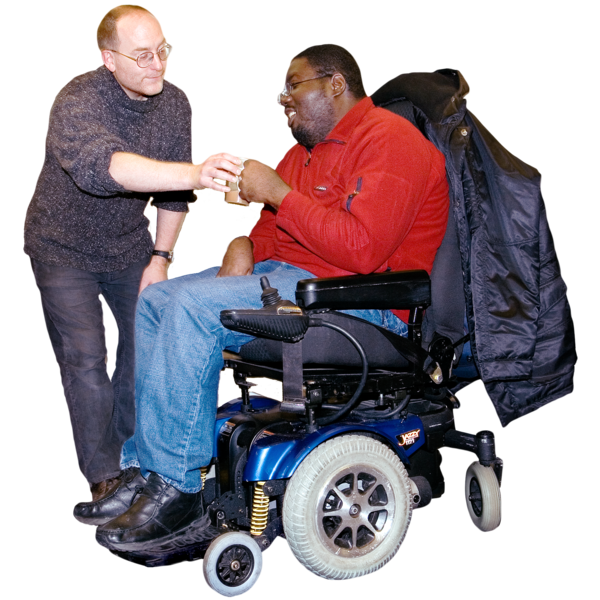The Care Act strengthens the
rights
 Rights are the things everyone should be allowed to do like have a say, or go to school.
of people who care for a disabled adult.
Rights are the things everyone should be allowed to do like have a say, or go to school.
of people who care for a disabled adult.
Key rights for carers
The Care Act sets out the following rights for people who care for a disabled adult:
- A carer will be entitled to an
assessment
 An assessment is a way of finding out what help a person needs. When you have an assessment, you might have to go to a meeting or fill in a form.
if it appears that they need support. The carer’s assessment must establish whether the carer is willing and able to continue providing care to the disabled person they are caring for, what impact this has on the carer’s wellbeing, what outcomes the carer wishes in day-to-day life, and whether the carer wishes to access
education
An assessment is a way of finding out what help a person needs. When you have an assessment, you might have to go to a meeting or fill in a form.
if it appears that they need support. The carer’s assessment must establish whether the carer is willing and able to continue providing care to the disabled person they are caring for, what impact this has on the carer’s wellbeing, what outcomes the carer wishes in day-to-day life, and whether the carer wishes to access
education
 Education is when you learn things. When you fill in a form to get a job, education means you write where you went to school, college or university.
, training, or recreational activities.
Education is when you learn things. When you fill in a form to get a job, education means you write where you went to school, college or university.
, training, or recreational activities.
- The carer will have the same rights to an assessment and support as the disabled adult themselves. Therefore once a carer’s assessment has been carried out, the
local authority
 A local authority is also called a
council
A local authority is also called a
council
 A council is also called a local authority. They are a group of people who make decisions about some of the things in the area where you live. These include: schools,
social care
A council is also called a local authority. They are a group of people who make decisions about some of the things in the area where you live. These include: schools,
social care
 Social care means the services that give care and support to people who need it.
(support for people), parks and dustbin collection.
. They are a group of people who make decisions about some of the things in the area where you live like schools, social care (support for people), parks and dustbin collection.
will see which of the carer’s needs are eligible for support, and will then produce a support plan to meet the carer’s needs.
Social care means the services that give care and support to people who need it.
(support for people), parks and dustbin collection.
. They are a group of people who make decisions about some of the things in the area where you live like schools, social care (support for people), parks and dustbin collection.
will see which of the carer’s needs are eligible for support, and will then produce a support plan to meet the carer’s needs.
- Local authorities are under a duty to meet a carer’s eligible needs, subject to a financial assessment.
Useful links on The Care Act
- Carers UK: www.carersuk.org/help-and-advice/practical-support/getting-care-and-support/care-act-faq
- Carers Trust: www.carers.org/care-act
Useful resources
We've created the following factsheets to help you with the benefits application, Care Act assessment and follow-up process:
- Delays in receiving benefits (PDF, 52 KB) - this factsheet explains the options that may be available to you whilst you're waiting for your first payment.
- Mandatory reconsiderations (PDF, 48 KB) - this factsheet explains what to do if you wish to challenge a benefit decision.
- Reasonable adjustments (PDF, 425 KB) - this factsheet explains what changes should be made by the Job Centre and DWP for people with a
learning disability
 A learning disability is to do with the way someone's brain works. It makes it harder for someone to learn, understand or do things.
who are looking to claim benefits.
A learning disability is to do with the way someone's brain works. It makes it harder for someone to learn, understand or do things.
who are looking to claim benefits.
- What happens next (PDF, 367 KB) - this factsheet sets out what should happen after your Care Act assessment.
- Reviews and new assessments (PDF, 219 KB) - this factsheet is for people who already receive care and support through a package of social care and what they can expect from the review and assessment process.
- Direct payments (PDF, 72 KB) - this factsheet explains how people with a learning disability and their families can receive
direct payments
 Direct payments are when the money for your care and support, or benefits, is paid to you.
to arrange their social care support themselves.
Direct payments are when the money for your care and support, or benefits, is paid to you.
to arrange their social care support themselves.
Support for carers

Caring for a child
Do you care for a child or young person who has a learning disability?
If so, take a look at what support is available to you, your family, and the person with a learning disability.
